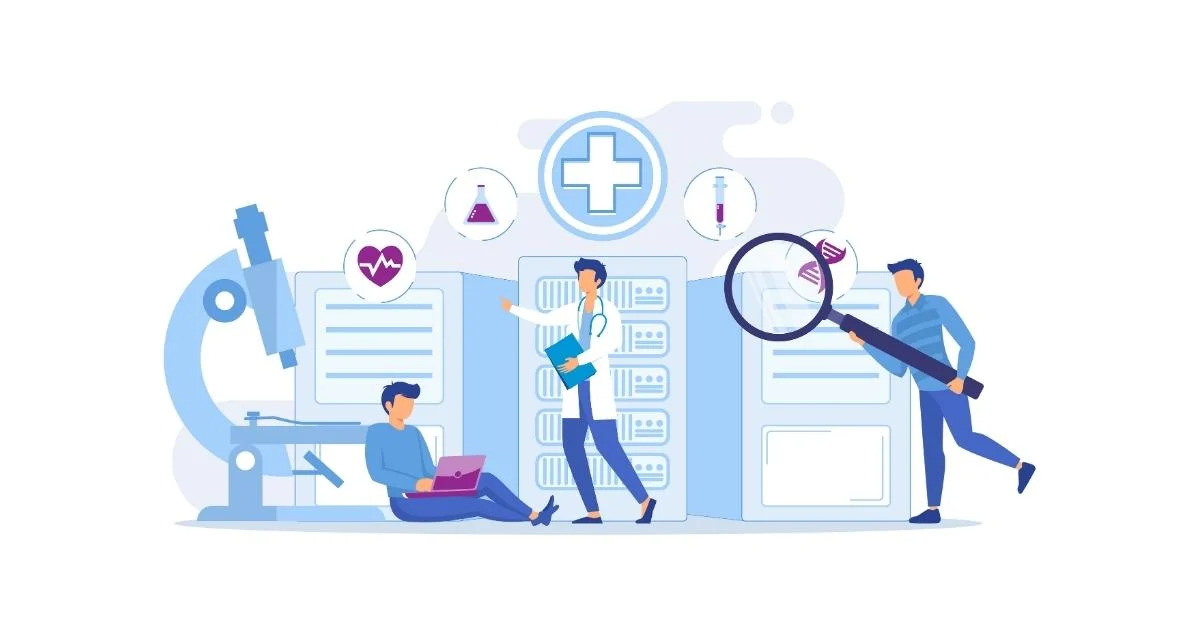AI Improves the Scalability of Patient Management Systems
-
How AI for Enterprise Improves the Scalability of Patient Management Systems

In today’s rapidly evolving healthcare landscape, scalability is a crucial factor for healthcare providers managing increasing patient volumes, complex workflows, and ever-growing data needs. Traditional Patient Management Systems (PMS) often struggle to keep pace, leading to inefficiencies, operational bottlenecks, and reduced quality of care. AI for Enterprise offers a scalable solution, enabling healthcare organizations to expand their operations while maintaining efficiency and high-quality patient care. In this blog, we will explore how AI for Enterprise improves the scalability of Patient Management Systems and transforms healthcare operations.
The Importance of Scalability in Patient Management Systems:
Meeting Growing Healthcare Demands
As patient numbers continue to rise and healthcare organizations expand, the ability to scale operational systems efficiently becomes critical. Traditional Patient Management Systems are often not equipped to handle the increased workload that comes with higher patient volumes, more complex care processes, and a growing demand for personalized care. This lack of scalability results in administrative bottlenecks, delays in care, and decreased patient satisfaction.
AI for Enterprise offers a powerful solution, providing the infrastructure to scale PMS effortlessly. With AI-driven tools, healthcare providers can automate routine tasks, manage larger datasets, and streamline workflows without compromising quality. As healthcare organizations grow, AI ensures that Patient Management Systems can expand alongside them, maintaining optimal performance.
Automating Repetitive Administrative Tasks:
The Impact of Automation on Scalability
One of the key ways that AI for Enterprise improves scalability is through the automation of routine administrative tasks. Manual processes such as scheduling, billing, and patient communications take up significant time and resources, especially as patient volumes grow. Without automation, scaling these operations requires additional administrative staff and increased overhead costs.
AI-powered automation reduces the need for manual intervention in these tasks, allowing healthcare organizations to handle higher patient volumes without requiring proportional increases in staff. For example, AI-driven Healthcare Automation Software can manage appointment bookings, process billing, and handle patient inquiries, all without human intervention. This allows healthcare providers to scale their operations efficiently, focusing more on patient care and less on administrative tasks.
Real-Time Data Integration for Seamless Operations:
The Role of AI in Managing Large Volumes of Data
As healthcare organizations scale, the volume of patient data increases exponentially. Traditional Patient Management Systems often struggle to integrate and manage data from multiple sources, leading to delays in accessing critical information and fragmented care. AI for Enterprise addresses this challenge by offering real-time data integration, ensuring that all patient information is accessible and accurate.
AI systems can seamlessly integrate data from electronic health records (EHRs), diagnostic tools, and wearable devices into a unified platform. This real-time integration ensures that healthcare providers have a complete view of each patient’s health, improving decision-making and care coordination. By scaling data integration with AI for Enterprise, healthcare organizations can provide consistent, high-quality care regardless of the number of patients they manage.
Enhancing Patient Engagement with AI Chatbots:
Scaling Patient Communication with AI
As patient volumes increase, maintaining effective communication with patients becomes a significant challenge for healthcare providers. Traditional communication methods, such as phone calls and emails, are time-consuming and resource-intensive, making it difficult to scale without adding administrative staff.
AI chatbots in healthcare offer a scalable solution by automating patient communications. These chatbots provide real-time, 24/7 support, helping patients schedule appointments, receive medication reminders, and get answers to common questions. By automating these interactions, healthcare organizations can engage with a larger number of patients while maintaining a high level of service.
AI chatbots ensure that patients receive timely responses, enhancing satisfaction and adherence to care plans. This scalable communication method is particularly valuable as healthcare providers expand their patient base, allowing them to offer personalized care without overwhelming staff.
Predictive Analytics for Proactive Patient Care:

Using AI to Scale Personalized Care
As healthcare organizations grow, providing personalized care to each patient becomes more challenging. Traditional Patient Management Systems often rely on reactive care models, addressing health issues only after they arise. However, as patient numbers increase, a reactive approach can lead to overcrowded facilities, longer wait times, and a reduced quality of care.
AI for Enterprise enables healthcare providers to take a proactive approach through predictive analytics. By analyzing historical and real-time patient data, AI tools can identify patterns and predict potential health issues before they become serious. This allows healthcare providers to intervene early, delivering personalized care that improves patient outcomes.
With AI, healthcare organizations can scale personalized care effectively, ensuring that even as patient volumes grow, each individual receives the attention and care they need.
Optimizing Billing and Claims Management:
Scaling Financial Processes with Automation
Billing and claims management are complex tasks that often become bottlenecks as healthcare organizations grow. Managing these processes manually is time-consuming and prone to errors, leading to delayed payments and reduced cash flow. AI for Enterprise addresses this challenge by automating billing workflows, ensuring that invoices are generated accurately, claims are submitted promptly, and payments are processed efficiently.
By using Healthcare Automation Software to handle billing and claims management, healthcare providers can scale their financial operations without adding additional administrative staff. This not only improves cash flow but also reduces the risk of billing errors and claims disputes, allowing organizations to scale smoothly and maintain financial stability.
Strengthening Data Security and Compliance:
Ensuring Scalable Security Solutions
As healthcare organizations scale, protecting sensitive patient data becomes increasingly challenging. Larger organizations face a higher risk of data breaches, and ensuring compliance with regulations such as HIPAA requires robust security measures. AI for Enterprise offers scalable security solutions that protect patient data while ensuring compliance with industry regulations.
AI systems use advanced encryption, real-time monitoring, and automated access controls to secure sensitive data. These systems can detect potential security threats and respond proactively, ensuring that patient information remains protected at all times. By using AI for Enterprise, healthcare providers can scale their operations confidently, knowing that their data security measures will grow alongside their organization.
Reducing Operational Costs Through AI Automation:
Cost-Effective Scaling with AI
One of the major challenges healthcare providers face when scaling is managing the increased operational costs associated with larger patient volumes. Hiring additional staff, expanding facilities, and implementing new systems all add to the financial burden. However, AI for Enterprise offers a cost-effective solution by automating routine tasks and optimizing workflows.
By reducing the need for manual intervention in scheduling, billing, data entry, and patient communications, AI systems lower operational costs while improving efficiency. This allows healthcare organizations to scale their operations without a proportional increase in expenses, making growth more sustainable.
Conclusion:
AI for Enterprise is revolutionizing the scalability of Patient Management Systems, enabling healthcare providers to expand their operations while maintaining high levels of efficiency, accuracy, and patient care. From automating routine tasks to integrating large volumes of data and improving patient engagement, AI-driven solutions provide the tools healthcare organizations need to scale effectively.
By adopting Healthcare Automation Software and AI for Enterprise platforms, healthcare providers can streamline their operations, reduce costs, and ensure that their systems can handle increasing patient volumes without compromising quality. To learn more about how AI for Enterprise can transform your Patient Management Systems.
